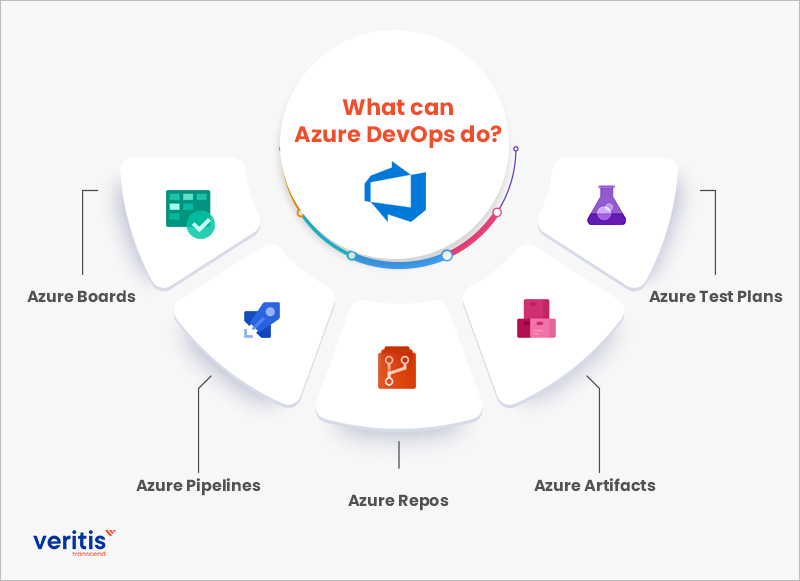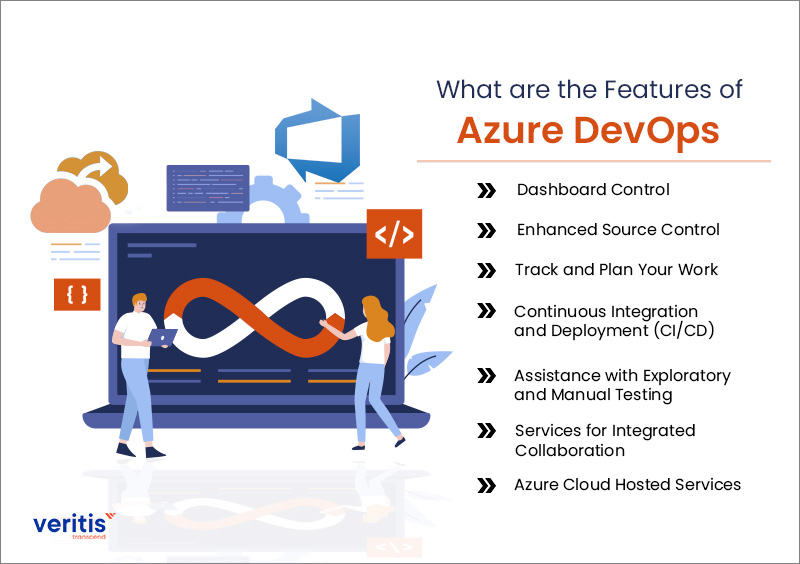
Table of contents
- What is Azure DevOps?
- When was Azure DevOps Introduced?
- What can Azure DevOps do?
- What About the CI/CD Tooling I Already Have?
- Azure DevOps Services vs Azure DevOps Server
- What are the Features of Azure DevOps
- Benefits of Azure DevOps
- Higher Innovation
- Rapid Application Deployment
- Enhanced Collaboration and Communication at the Workplace
- End-User Experience and Improved Customer
- On-the-Go Access
- Save Money and Time
- Develop Credibility
- Application Life Cycle
- Rapid Problem-Solving Capabilities
- Open Platform
- Continuous Integration and Delivery
- High Availability
- Maintaining Stability and Reliability
- Conclusion
What is Azure DevOps?
Microsoft’s Azure is a Software as a service (SaaS) platform that offers complete DevOps tools for creating and deploying software. It is an excellent choice for coordinating DevOps services and integrates with the majority of top tools on the market. No matter the language, platform, or cloud they use, many of DevOps Group’s clients have found that Azure DevOps fits their requirements.
Azure DevOps offers integration with popular open source and outside tools and services along the complete DevOps workflow. Make use of the programs and tools that you are familiar with. Deliver higher-quality software more quickly by spending less time integrating.
One of Azure DevOps’ most prominent features is its flexibility because it can integrate with other solutions on the market. In addition, it uses for shared management of the process flow and manages the entire DevOps toolchain collaboratively. This lets the organization take advantage of the tools already in use. Compared to other technologies now available on the market, Azure DevOps excels for three reasons.
Useful link: What is Azure Devops, Core Services, Advantages and Pricing?
Let’s have a look at the three major reasons:
1) Flexible
The flexibility of Azure DevOps allows for the independent use of each of its services. In addition, Azure DevOps integrates with the technologies already in use within the firm, which facilitates adaptation.
2) Platform Independent
Despite being a Microsoft product, Azure DevOps does not simply focus on platforms and languages created by Microsoft. Instead, it has been created to run on any operating system, including Linux, Windows, and macOS, as well as any language, including .Net, Java, PHP, Python, C, C++, iOS, and NodeJS.
3) Cloud Independent
In addition to Azure, Amazon Web Services (AWS) and Google Cloud Platform (GCP) are also supported by the Continuous Integration and Delivery model of Azure DevOps.
When was Azure DevOps Introduced?
Despite its October 2018 launch, Azure DevOps is not a newcomer to the DevOps block. Its ancestry may trace back to the 2006 Visual Studio Team System release. Over 80,000 Microsoft internal users use this well-developed application with rich features.
What can Azure DevOps do?

Azure DevOps api comprises several services spanning the entire software development life cycle (SDLC). The following services make up Azure DevOps api, which is not a single program.
1) Azure Boards
This includes tools for agile planning, tracking work items, reporting, and visualization. It offers native support for Scrum and Kanban for Agile on the backend. In addition, it offers customizable dashboards with integrated reporting that can scale to meet business requirements.
2) Azure Pipeline
Considering that Azure pipeline is DevOps solutions, it undoubtedly offers Continuous Integration and Continuous Delivery (CI/CD). Furthermore, it is a CI/CD platform with support for Kubernetes or containers that is cloud-agnostic in terms of both platform and language.
3) Azure Repos
It offers privately hosted cloud git repos. In addition, the development team can use a group of version control tools to manage codes and their various versions. As a result, tracking changes made to the code over time and between various versions makes it easy.
4) Azure Artifacts
Azure DevOps API enables the teams to quickly package the dependencies and other artifacts needed for the deployment and functionality of the application. It makes it simple to distribute and use the application. It offers integrated package management and supports package feeds from public or private sources for Python, Maven, and NuGet.
5) Azure Test Plans
Azure Test Plans are a collection of robust and effective tools for testing your application, including manual/exploratory testing and continuous testing. It offers a comprehensive solution for scheduled and exploratory testing. In addition, they are simple to use, browser-based test management solutions that offer all the functionality needed for various testing approaches.
What About the CI/CD Tooling I Already Have?
Azure DevOps’ flexibility is one of the features we value the most. It is versatile enough to use your existing tools and expandable (through a marketplace). For instance, if you wanted to provide and manage Azure infrastructure using third-party tools such as Ansible, Chef, Puppet, and Terraform, you could. You could also use Azure Resource Manager for infrastructure as code.
Useful link: Microsoft Azure Disaster Recovery Services
Azure DevOps Services vs Azure DevOps Server
The server and the services were referred to as Team Foundation Server (TFS) and Visual Studio Team Services (VSTS), respectively. They offer environments compatible with Agile tools, continuous integration, and Git. First, let’s go through how they differ from one another:
| Azure DevOps Services | Azure DevOps Server |
| It is a cloud-based service | It is an on-premise service |
| Organizations and projects are the two alternatives available for scaling and scoping data | Deployment, project collections, and projects are the three alternatives it provides for scaling and scoping data |
| You can link up using the public network | You can link up using the intranet server |
| Every user requires to have the same access level | Based on the licensing, must set access levels |
What are the Features of Azure DevOps?

Azure DevOps solutions enables groups to organize their work, host their code repositories, and launch their applications.
A wide range of functionalities is available for development teams in Azure DevOps extensions services. Consider this:
1) Dashboard Control
You may add and manage dashboards, configure dashboard widgets, and rapidly navigate to various project areas with the DevOps dashboard functionality.
2) Enhanced Source Control
Both Git (distributed) and Team Foundation Version Control (TFVC), a centralized, client-server system, are popular forms of source control that are supported by Azure DevOps platforms. Azure Git tags may be added and managed, and files can be reviewed, downloaded, and edited to show change history.
3) Track and Plan Your Work
You can create a few different sorts of work items to track features, requirements, user stories, tasks, issues, and other things with the help of Azure DevOps tools. You can use a variety of backlogs and boards for planning that support the three primary agile methodologies: Kanban, Scrum, or Scrumban. For instance, you can add and modify pertinent work items, organize sprints using sprint backlogs, visualize the workflow manage the product backlog, and update statuses using Kanban boards.
4) Continuous Integration and Deployment (CI/CD)
CI/CD is a popular practice among developers, and Azure DevOps supports it. Azure DevOps engineer can automate numerous design procedures using Azure pipelines, specifying builds and associated procedures, developing test instructions, and managing simultaneous releases.
5) Assistance with Exploratory and Manual Testing
The test capabilities of Azure DevOps extensions provide manual, exploratory, and continuous testing. It includes end-to-end traceability, criteria-based selection, and real-time charts that display test activities. It also provides workflow customization.
6) Services for Integrated Collaboration
Teams may work together with all of the Azure DevOps tools and functionalities using the following feature:
- The ability to manage and request feedback
- Discussing work item forms
- Power BI reporting, analytics service, and analytical views
- Change notifications and alerts controlled by users, teams, projects, or organizations
- Project wiki
- Establishing connections between work items, commits, pull requests, and other traceability-supporting artifacts
- Team dashboards
7) Azure Cloud Hosted Services
Azure offers cloud-hosted services that facilitate the development and deployment of applications to DevOps teams. These offerings can use independently or in conjunction with Azure DevOps framework.
Useful link: What is Azure DevOps and How it Helps Businesses Drive Growth
Benefits of Azure DevOps

On the Azure DevOps platform, you and your team can work together more efficiently to develop and maintain your application more quickly.
Azure DevOps has become more popular, and businesses are considering implementing improvements. As a result, they prioritize working together with development and operations to employ agile business techniques more.
Start-ups are aggressively implementing Azure DevOps services to benefit their businesses. But it’s crucial to assess whether adopting and implementing Azure DevOps is risk worthy. But if a company adopts Azure DevOps properly, it can profit from the following benefits. Let’s go through the benefits of Azure Devops.
1) Higher Innovation
Azure DevOps adoption results in enhanced business productivity and streamlined processes. This allows you additional time during the workday to generate and develop new ideas. The more time a company has to improvise and innovate, the more opportunities it has to develop and succeed.
The best businesses in the world dedicate more time to their team’s efforts in developing new products and methods for achieving enhanced outcomes.
2) Rapid Application Deployment
New business processes, systems, and apps may be quickly deployed using DevOps techniques. As a result, the business processes become more productive due to DevOps deployment.
Results are delivered rapidly with DevOps implementation. This is because when the team members collaborate on the projects, the development and deployment processes move more quickly.
This might be advantageous from a business perspective because it allows companies to produce results on schedule. But, this may be the most significant advantage for a company that uses Azure DevOps framework.
3) Enhanced Collaboration and Communication at the Workplace
DevOps enhances communication and collaboration among multiple departments, which unites the employees. As a result, employees gradually develop better working relationships with one another. As a result, there are multiple methods to increase team morale.
Due to this, DevOps implementation is one of the best methods for managing teams working on one or more projects. It is often believed that when employees get along well, everyone is happier. Therefore, the organization can benefit from the productivity of employees who collaborate effectively by implementing Azure DevOps.
4) End-User Experience and Improved Customer
Your company can provide the business customer quick service if it can swiftly build proprietary solutions. This suggests that using DevOps will enhance your company’s ability to serve customers.
In a recent survey on the use of DevOps in business, it was found that more than 70% of companies felt that DevOps deployment improved customer experience. This may be pretty beneficial for the company. More earnings and revenue can also be generated by improving customer satisfaction and the customer experience.
5) On-the-Go Access
With safe access to the environment from any location via any device, Azure DevOps environment gives your team more flexibility. Azure DevOps can be your best option if your business has multiple locations, or your team members work remotely.
6) Save Money and Time
The most crucial resources for a business are time and money. In many cases, you can’t afford to waste your resources on products that will only increase your workload. For instance, your business must allocate funds for the necessary infrastructure, server upkeep, and operating system licenses if TFS or other DevOps servers are run locally.
If you choose Azure DevOps Services, Microsoft will take care of infrastructure security, backups, updates, and server maintenance, so you won’t have to worry about these things.
Useful link: How of Cloud Migration: Azure and Its 4-Step Strategy
7) Develop Credibility
Usually, letting potential customers know that you work with Microsoft products helps to relieve their concerns. In addition, users can reassure them by pointing out that Azure DevOps possesses several compliance certificates for cloud-based software, including ISO 27001, SOC 1 and SOC 2, and HIPAA BAA.
Azure DevOps consulting services can provide some of the information required if your company is aiming for one of these compliance certificates.
8) Application Life Cycle
You require a system created from the ground up with software development for continuous integration. Azure DevOps impacts an application’s lifespan during the planning, creating, delivering, and operating phases. Since each phase depends on the others, they require the proper tools and materials to fulfill their requirements.
Azure DevOps gives you control over appropriate application development, with thorough testing and frequent updates at your fingertips.
You are no longer required to worry about how each phase of the creation of the product will play out. Instead, every aspect of handling and navigating is made simple by Azure DevOps.
9) Rapid Problem-Solving Capabilities
Enterprises can try to quickly resolve the issues with the help of Microsoft Azure DevOps. The ability to resolve the issue in a short amount of time has many benefits. However, process issues may result in severe financial losses for your company.
When issues are rapidly resolved, business losses are avoided, and progress is made more quickly. Azure DevOps improves your company’s capacity for problem-solving. For all of your business operations, Azure DevOps produces a beneficial improvement.
10) Open Platform
With community and commercial tools, Azure DevOps offers deep integration. The early version of TFS was a closed-off, one-vendor system; this is far from that.
As previously said, hundreds of extensions are accessible in the marketplace, so chances are good that if Azure developers don’t already support something, a tool is available there.
11) Continuous Integration and Delivery
Azure DevOps offers a solid foundation for software-driven organizations so that you can deploy your solutions in a pipeline that supports continuous integration and deployment. In addition, the Azure DevOps CI/CD pipeline can help you move your solution from development to Azure DevOps delivery plan whether hosted on Azure or AWS.
12) High Availability
When you use Azure for DevOps, you’re entering into a contract with Microsoft, and your service level agreement assures a 99.9% uptime with access to support and Azure for DevOps consulting services around the clock.
13) Maintaining Stability and Reliability
Deployment across numerous instances and application compliance can both be managed through Azure’s DevOps. Many development teams invest a lot of time in keeping up with compliance.
Explore DevOps Services and Solutions
Conclusion
A company can get unique, custom tools that are made for them by directly integrating open-source tools into Azure. Azure’s infrastructure as code, continuous monitoring, and continuous integration can all be coupled to the Azure DevOps platform to give a company everything it requires in a single, tightly integrated package.
Companies can choose to use Spinnaker to build repeatable deployments in Azure, Github to automate workflows, and Azure Pipelines to manage releases across several environments. Azure DevOps offers comprehensive solutions to challenging issues. The Azure for DevOps tools provided by Azure are naturally helpful for businesses currently utilizing its services. This is where Veritis guides companies on implementing Azure DevOps for a successful business.
Veritis, the Stevie Award Winner, for DevOps services, delivers high value to customers through responsive, integrated, reliable, and customized solutions. Veritis has been a trusted partner for several organizations, including Fortune 500 firms. So, get in touch with us, and we will offer you the best Azure DevOps services with a cost-effective solution.
Talk to Our Azure DevOps Expert
Additional Resources: